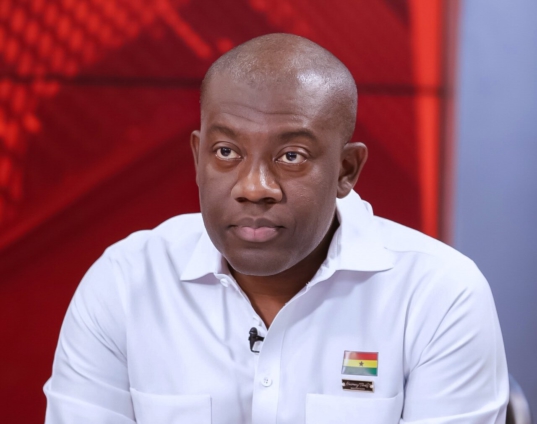
Audio By Carbonatix
The Information Minister, Kojo Oppong Nkrumah, has dismissed claims that government is the cause of the country’s decline in the 2022 Press Freedom Index.
Speaking in Parliament, the Minister noted that after comprehensive investigations, the slump can be attributed to poor remuneration of journalists.
In May, it came to light that Reporters Without Borders (RSF) in its Press Freedom Index had ranked Ghana in the 60th position.
The latest report meant the country had dropped 30 places from the previous position.
Following the revelation, considerable conversation transpired with some blaming state agents’ attacks on journalists as the cause of the slump.
But addressing the House on Thursday, Mr Oppong Nkrumah said the inability of media houses to adequately pay their journalists is a major cause of the decline.
He explained that except for the economic context, the press in Ghana performed extremely well under the other four parameters of the new methodology.
The Minister indicated that:
- Legal framework - 81.42%
- Social-cultural context - 79.64%
- Political context - 66.61%
- Security of journalists - 62.25%
- Economic context - 47.22%
On the back of this, the Information Minister noted that economic context “dragged us heavily on the composite score.”
And here, [Economic] RFS refers to the poverty of individual journalists and media houses. And the facts are clear in this country that because we have opened up the media landscape extensively which is a very good thing, a number of media houses have sprung up and a chunk of them struggle to make ends meet.
“Even this week, you will find a number of reports about some media houses struggling to pay salaries and the RFS contends that when journalists are not paid, the ability to do a sacrosanct free job is questionable,” he explained.
Already, the New Patriotic Party (NPP) has condemned portions of the 2022 World Press Freedom Index which tagged the Akufo-Addo administration as “intolerant of criticism from citizens and the media.”
The Party argued that, in contrast, the media under the NPP is the freest ever.
The NPP’s Director of Communications, Yaw Boaben Asamoa noted that the party’s contribution to the growth of the media under the Fourth Republic is rather exceptional.
“The NPP believes Ghana’s media is the freest ever and that its contribution to media growth are unparalleled in the Fourth Republic.
“In sum, NPP decriminalised speech, supported infrastructure and training with the International Press Centre and support funds and improved spectrum allocations and regulatory oversight,” he said.
Latest Stories
-
NSA Director General admits 17 recruits did not go through due process
27 seconds -
Kensei-Kai partners Ghana Karate Federation for high school coaching workshop
6 minutes -
Kofi Kapito calls for investment in high-quality hospital beds
8 minutes -
Asokore Mampong MCE Ben Abdullah Alhassan denies Interior minister land grab claims
13 minutes -
Ghana activates border bases, deploys defence attachés after Burkina Faso terrorist attack on traders
15 minutes -
PPA targets 90% drop in procurement breaches with full e-procurement rollout
16 minutes -
Sustainable aviation fuels could unlock major economic opportunities for Ghana, ICAO expert says
24 minutes -
Ghana takes major step towards sustainable aviation with SAF feasibility workshop
26 minutes -
Ghana International School and Coral Reef Innovation Africa sign landmark MoU to establish innovation center of excellence
29 minutes -
Ghana poised to lead Africa’s green aviation revolution, says GCAA Director-General
30 minutes -
Chinese dance group’s tour triggers bomb threat against Australian PM
41 minutes -
Senegal PM proposes doubling prison sentence for same-sex relations
42 minutes -
Clement Apaak defends dog and cat meat consumption, rejects health and ethical criticism
44 minutes -
Minority leader Alexander Afenyo-Markin urges government to enable, not control economy
45 minutes -
Mercy to the World scales up Ramadan feeding campaign, targets over 25,000 people
47 minutes

